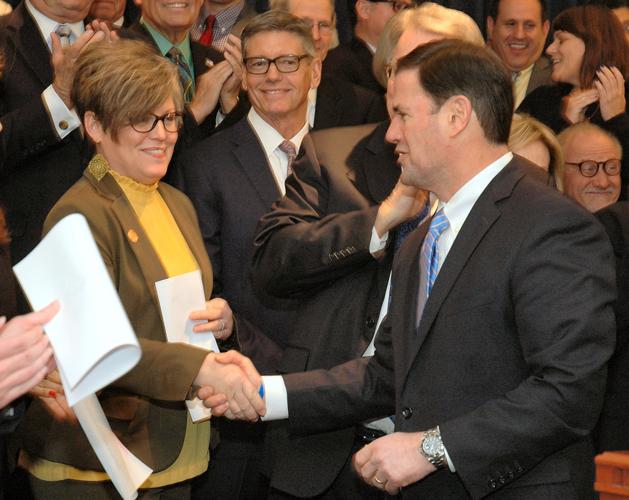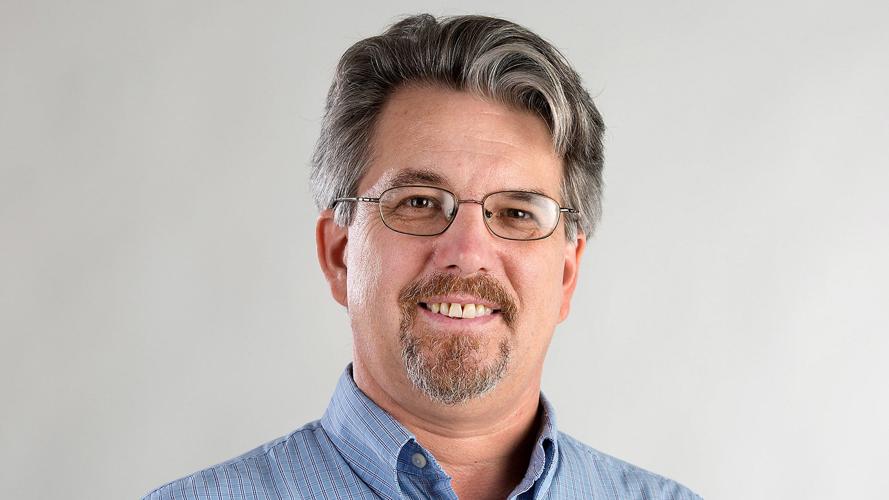In the old days, a dispute about Arizona election procedures would probably not draw much attention.
In fact, it might not even become public. The fighting parties might have worked out their differences and moved on.
But these are not those days. These are the pandemic days of intense focus on who can vote how, on claims of “rigged” elections, “voter fraud” and “election integrity issues.”
These are the days when the president of the United States refuses to commit to leaving office unless they “get rid of the ballots,” as Donald Trump said last week.
So when Republican Gov. Doug Ducey’s office last week took on Democratic Secretary of State Katie Hobbs over two new accommodations for registering and voting, the stakes were high — even though the number of votes affected is extremely low.
The conflict heightened Friday, when Maricopa County Recorder Adrian Fontes, a Democrat, filed suit, seeking confirmation that his way of helping voters isolated in assisted living is legal.
The underlying issue is confidence in the election results. And it may never have been as important as in today’s environment.
That’s because Trump and his team are doing their best to undermine confidence in mail-in ballots and the entire election — unless it goes in his favor.
Just last week, the Trump administration took a small administrative error and turned it, quite literally, into a federal case. Employees at an election office in Luzerne County, Pennsylvania, discovered a temporary worker had mistakenly thrown away nine ballots. The county employees realized the problem, dug in the trash, found the ballots and reported what had happened.
The U.S. attorney for the Middle District of Pennsylvania issued a news release announcing the investigation — an unusual step on its own — and specified that seven of the recovered ballots showed votes for Trump, suggesting that was the motivation. Attorney General William Barr even briefed Trump on the minor incident, and the president cited it as evidence of widespread fraud. Overall, a ridiculous series of events.
The FBI director, Christopher Wray, testified Thursday there is no evidence of broad efforts at fraud in the country. That statement drew harsh criticism from Trump’s chief of staff.
It’s all part of an ongoing effort to undermine confidence in the election in case Trump should lose.
That’s the national context in which the conflict between Ducey and Hobbs emerged this week. Hobbs had spelled out for the 15 county recorders two accommodations they could make — one for voter registration by people in remote areas and one for voting by people in care facilities such as hospitals or assisted-living homes.
The latter accommodation was made for people in very specific circumstances: They are in a care facility, want to vote by mail, receive an early ballot, cannot fill out the ballot by themselves, do not have a trusted person to fill out their ballot, as allowed by law, and cannot accept visitors due to COVID-19 restrictions. It’s a very small number of voters.
In normal times, people in those conditions can be accommodated by what’s known as a “special election board” — a man and woman from both political parties who go to visit the voter, fill out their ballot, and turn it in.
Because some of those facilities aren’t allowing visitors during the pandemic, Fontes’ office developed a system whereby the special election board brings two tablet computers, sends one in to the voter, checks the voter’s ID remotely, has the ballot sent out, then reads the ballot to the voter via videoconference and fills out the voter’s selections.
It was a creative way around visitation problems, I thought. Hobbs told recorders they could use the system if needed, knowing that it would probably only be relevant in Maricopa and Pima counties.
F. Ann Rodriguez, the longtime recorder in Pima County, supports this process in part, she said, because “we were stumbling on this in the primary.”
“This is a group of people we know exists, because we’ve been helping them for years,” said Rodriguez, a Democrat. With this, “we found a solution to the problem.”
The other accommodation is for people who do not have a driver’s license, do not have internet service and want to register in the coming days when there may not be enough time for voting officials to mail out a registration form and get it back before the Oct. 5 deadline.
The solution, intended mostly to help people on the Navajo Nation and other reservations, is that by Oct. 5, people could call the Secretary of State’s Office, where employees would take down the registrant’s information by phone. The secretary of state would then mail the information to the relevant county recorder’s office and send a copy to the voter’s residence.
To be eligible to vote, the person would then have to sign the form and turn it in to the recorder’s office by Election Day, or do so at a polling site. Coconino County Recorder Patty Hansen told me that, in her experience, it was unlikely that more than one or two of the voters the accommodation is intended for is likely to take advantage of the phone assistance.
“It’s my experience most Navajo people want to do this in person,” said Hansen, a Democrat. “I can’t see many people calling a telephone number.”
Rodriguez and some other recorders weren’t fond of this accommodation because it meant confirming registrations all the way up to Election Day, setting up possible confusion and conflicts.
On Sunday one recorder, Yuma County’s Robyn Stallworth Pouquette, a Republican, wrote to Ducey staffer Daniel Ruiz, who has a background in election management, to object that these accommodations were not specifically contemplated in the state elections procedure manual or law.
An exchange of letters between the governor and secretary of state followed, with the governor objecting to any changes in procedures this late in the election process.
Members of liberal groups found out about the conflict and put out a press release Tuesday, which led to a big public effort by Ducey’s office to push back. His spokesman, Patrick Ptak, sent an email to reporters with the subject line “Election integrity issues.” Chief of Staff Daniel Scarpinato wrote a 17-tweet thread on Twitter decrying Hobbs’ actions.
Scarpinato argued that the late tweaks to procedure were not allowed by law, could damage the public’s faith in the process and lead to post-election litigation.
“When the law is not followed on elections, it creates doubt,” Scarpinato said Friday. “It’s important that the law is followed so there isn’t doubt.”
In an interview, Hobbs said she thinks these accommodations are legal and that the Governor’s Office, with which she previously had a strong partnership, is the one creating doubts.
“This is an attack on our office and an attempt to begin to undermine my credibility, the integrity of the election, and the legitimacy of the vote,” she said. “It’s right out of the playbook that we’re seeing across the country.”
That’s a playbook we need to throw away if we’re to maintain electoral peace in Arizona. If the state’s two top officers, Ducey and Hobbs, can’t figure it out, better that the courts make the decision soon.





